(#AmazonAdLink)  My book, (#AmazonAdLink) What is Hell? is now available (#AmazonAdLink) on Amazon. I am doing a series of podcast studies that focus on some of the content from the book. The studies look at the eight key terms that are often equated with hell, and about a dozen key passages that are thought to teach about hell.
My book, (#AmazonAdLink) What is Hell? is now available (#AmazonAdLink) on Amazon. I am doing a series of podcast studies that focus on some of the content from the book. The studies look at the eight key terms that are often equated with hell, and about a dozen key passages that are thought to teach about hell.
If you want to learn the truth about hell and what the Bible actually teaches about hell, make sure you get a copy of my book, (#AmazonAdLink) What is Hell?
Also, if you are part of my discipleship group, there will be an online course about hell as well.
In this study, we will consider the phrase “everlasting fire” as it is used in Matthew 25:41.
What is the Everlasting Fire of Matthew 25:41?
Let us begin by looking at the text.
Then he will also say to those on the left hand, ‘Depart from Me, you cursed, into the everlasting fire prepared for the devil and his angels:’
This text is one of the more difficult passages to understand about the image of fire in the Bible. However, when studied in connection with what the Bible teaches about hell, this verse is not as difficult as it first appears.
Hell is a Kingdom
As discussed in a previous study, the Bible teaches that hell is a kingdom which is diametrically opposed to the kingdom of heaven. Everything that is true of the kingdom of heaven is also true of the kingdom of hell, but in opposite form.
This will help us understand the parallels in this passage between “the fire prepared for the devil and his angels” and “the kingdom prepared for you” (Matthew 25:34).
The Context of Matthew 24-45
A proper understanding of this passage is further aided by taking careful note of the context in which it occurs.

The entire Olivet Discourse (Matthew 24–25) must be understood as Jesus’ answer to two questions from the disciples. They had just come from the temple where Jesus had said that the entire structure would be destroyed. By this, He wasn’t just referring to the building, but to everything it represented.
Jesus was not impressed with religious buildings or the religious establishment they represented. He wanted both to disappear so that people could personally connect with God in freedom and grace.
So Jesus told His disciples that it would all be destroyed, not just the temple, but what it represented as well (Matthew 24:1-2).
Two Questions
In response, the disciples ask two questions.
They want to know (1) when these events will take place, and (2) what will be the signs of His coming and the end of the age (Matthew 24:3).
At this point, the disciples do not realize that Jesus will die on the cross, rise again, and then ascend into heaven. So when they ask about the signs of His coming, they are not referring to His “second coming” the way we think of it today, but to their expectation of how He will be coming into His throne.
They expected the Messiah to overthrow Roman rule and come into His rightful place as the ruler of the entire world. These events would indicate the end of the age and the start of the new, Messianic age. They wanted to know when the war with Rome would begin, and what signs would show its beginnings.
All of the teachings and parables of Matthew 24–25 must be read in light of these two questions. Jesus not only seeks to answer their questions, but also to correct their thinking about His coming.
Jesus wants to show them that His coming from heaven to earth has already occurred in His incarnation, and that the works they have already seen Him perform are the only type of works that His kingdom produces. His kingdom will spread over the face of the earth as promised, but not with military might, political power, or religious regulations (cf. Luke 4:1-13). It will spread through peace and grace.
He first provides the signs of His coming at the end of the age (Matthew 24:4-51). As indicated everywhere else in Matthew, the “age” in which Jesus and His disciples lived ended with His death and resurrection.
The new age began with the birth of the church in Acts 2, but there was a transitionary period with the dying throes of the old age and the birth pains of the new. Some of these dying throes of the old age were evident in the destruction of Jerusalem, its temple, and the religion it represented.
Many seek to consign the events of Matthew 24–25 into some future time period, but Jesus states in Matthew 24:34 that all these things will take place within one generation. One must engage in several hermeneutical contortions to get this statement to refer to more than forty years.
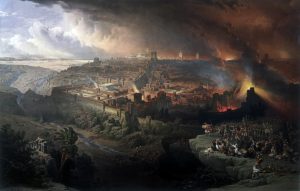 But if we take it at face value, then we see that the words of Jesus did come true within one generation. Less than forty years after Jesus spoke these words, the Roman military laid siege to Jerusalem, and eventually razed it to the ground, burned the temple, and killed over one million Jewish people.
But if we take it at face value, then we see that the words of Jesus did come true within one generation. Less than forty years after Jesus spoke these words, the Roman military laid siege to Jerusalem, and eventually razed it to the ground, burned the temple, and killed over one million Jewish people.
Some of those who heard Jesus say these words saw them come to pass, just as He promised.
Two Options for How to Live
At the end of this teaching section, Jesus presents the two possible options for living in this world as one of His followers (Matthew 24:45-51).
They can either (1) look for His coming which leads them to love and serve others, or (2) they can think that He is not coming and so live selfishly and violently toward others.
Again, when Jesus talks about His coming, He is not referring to His future “second coming” but to the coming of His kingdom in power and glory, which will spread over the face of the earth.
Jesus wants His followers to choose whether they will join Him and participate in spreading His kingdom over the earth, or if they will think that His coming is delayed (cf. 2 Peter 3:4), and so will live according to the values and principles (the kingdom) of this world.
Three Parables as Illustrations of the Two Options
Based on these two options, Jesus then presents three parables as illustrations.
These three parables of Matthew 25 compare and contrast the two kingdoms and how the followers of Jesus will affect and be affected by both.
And since Matthew 24:45-51 contrasted “believing and wise” servants with “unbelieving and foolish” servants, the three parables of Matthew 25 make a similar contrast.
The followers of Jesus are to live in a constant state of readiness for His return and also work to advance the kingdom while they wait. They live in a state of readiness by believing He will return soon, and they advance the kingdom by loving and serving others in His absence.
The three parables of Matthew 25 reveal what this new kingdom will be like (and not like) and how His followers can participate in its coming through their beliefs and behaviors.
These three parables not only show the two ways of living in this world as one of His followers, but they also correct the thinking of the disciples about what the kingdom of heaven will look like.
Jesus wants them to know that His rule and reign will not be like the Roman rule and reign. Jesus is not trying to simply replace Caesar. Though this is what most Jewish people wanted and expected, Jesus did not come to inaugurate a kingdom that looked and acted like the kingdom of Caesar.
The first and last parables, therefore, describe truths related to the kingdom of God, while the middle parable, the Parable of the Talents, describes truths related to the kingdom of Caesar.
The followers of Jesus must decide which kingdom they will serve.
The Parable of the Wise and Foolish Bridesmaids (Matthew 25:1-13)
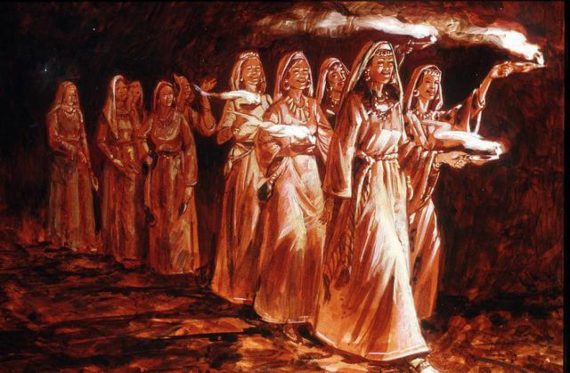
Jesus first describes the kingdom of heaven with the Parable of the Wise and Foolish Bridesmaids (Matthew 25:1-13). The point of this parable is to encourage His followers to live in a constant state of readiness for the coming of the kingdom.
This passage is not about who is going to heaven and who is not. This story is about participating in the wedding celebration when the bridegroom arrives and the kingdom party begins.
People can have eternal life and still miss out on most of the party. Whether we watch or sleep, we will live together with Him (1 Thess 5:10).
The Parable of the Talents (Matthew 25:14-30)
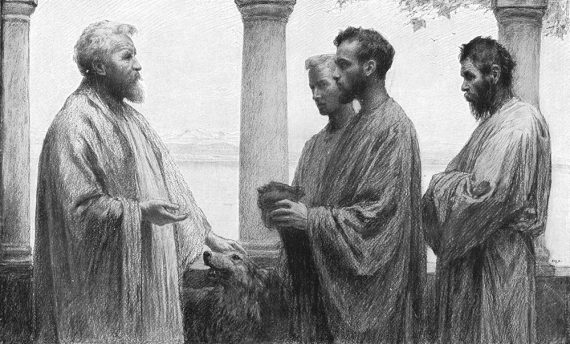
The next parable is the Parable of the Talents (Matthew 25:14-30).
This parable has been widely misunderstood.
Most assume that it also is about the kingdom of heaven and how Jesus is the man who traveled to a far country and will return, at which point He blesses those who helped increase His wealth and punishes those who did not.
But Jesus does not say that He is describing the kingdom of heaven. While most Bible translations do include the words “the kingdom of heaven” in Matthew 25:14, these words have been added by the translators and do not exist in the Greek.
Instead, having just invited his followers to look eagerly for the coming of the kingdom of heaven, Jesus now goes on to warn them what life would be like for them if they tried to live in the kingdom of this world.
Numerous lines of evidence support this view. Chief among them is the fact that the actions of this man who travels to a far country would have been understood as quite evil in the first century Mediterranean world. They not only closely follow the actions and behaviors of King Herod and how he went to Rome to become the king of Israel, but the values of this man also reveal the opposite of what Jesus taught and encouraged.
The first century Mediterranean world was guided by the cultural values of honor and shame. Modern western culture is guided by materialism.
Today, we value any activity which gets more money and gains more possessions.
But in an honor-shame culture, such activities were great sins. They believed that money and possessions were zero-sum commodities, which meant that the only way for one person to gain more money and possessions was by taking it away from someone else.
This was very shameful behavior. The first two servants, like their master, were exploiters. They gained more for themselves at the expense of their brethren.
So Jesus is saying that if one of his disciples does not look with anticipation for the coming of the kingdom of heaven, their only other option is to participate with the kingdom of this world, by imitating it in its greedy ways.
If a person does not follow the way of Jesus, they will either behave very shamefully in stealing from their brethren, or will receive harsh judgment and punishment from the rulers of this world for not participating in their greedy game.
The rulers of this world expect and demand their subjects to follow their twisted, thieving ways to enrich themselves at the expense of others. Those who refuse to follow these marching orders will be punished by the rulers, and will be banished to the darkness outside the party of this world.
But when followers of Jesus experience such treatment at the hands of the rulers of this world, they should not despair, for the punishment of worldly rulers is not the end of the matter.
The Parable of the Sheep and the Goats (Matthew 25:31-46)

Jesus now goes on in the final parable of Matthew 25 to show His disciples that even though they might be rejected by the kingdoms of men, they will not be rejected or despised by the kingdom of God.
Since the values and behaviors of the two kingdoms are diametrically opposed to one another, the consequences for actions are different as well. While a lack of greed brought punishment from the kingdoms of the world, this same behavior brings praise and honor in the kingdom of heaven.
With the Parable of the Sheep and the Goats (Matthew 25:31-46), Jesus shows the distinctive characteristics that separate the two kingdoms, and calls His disciples to choose which kingdom they will serve.
In this final parable, Jesus reveals that He, as the Son of Man Shepherd King, will be the one who decides which of His servants worked for the kingdom of heaven and which worked for the kingdom of earth.
While the Parable of the Talents showed that the kingdom of earth praises those who steal from the poor and give it to the rich, the Parable of the Sheep and the Goats reveals that the kingdom of heaven works the opposite way.
Jesus, the Lord of the kingdom of heaven, values the poor and needy, and gives praise and honor to those who tend to their needs.
So this final parable of Jesus ties the preceding two parables together.
Jesus told two parables showing two different ways of living in this world. One can either live in in the light of the kingdom of God or live with the values of the kingdom of this world. This final parable shows the consequences of living in the two opposing kingdoms.
Most studies on this parable go to great lengths trying to discern who Jesus has in view when He speaks of “the nations” (Matt 25:32) and the “the least of these, My brethren” (Matt 25:40). The “nations” can be identified with Gentile nations, unbelieving Jews, or unbelievers from all nations. The “least of these, My brethren” can be identified religiously as the group of people who follow Jesus and do His will (Matt 12:50; Mark 3:35; Luke 8:21), ethnically, so that Jesus’ brethren are the Jewish people, and therefore, all nations (Matt 25:32) that help Israel will be blessed (Gen 12:3), or eschatologically, so that the brethren of Jesus are believers who live during the future Tribulation period.
All such proposals, however, allow readers to ignore the overall lesson of the parable: A defining characteristic of the kingdom of God is that it will take care of the poor and needy of this world, wherever they are found, whatever religion or nationality they are of.
 Those who use this parable as justification to limit their care of the poor and needy to those of only one particular group of people or for people during one particular time period (e.g., the future Tribulation), self-identify themselves as a goat.
Those who use this parable as justification to limit their care of the poor and needy to those of only one particular group of people or for people during one particular time period (e.g., the future Tribulation), self-identify themselves as a goat.
Those servants of Jesus who believe that Jesus is returning soon, and live wisely as members of the kingdom of God, will work to feed, clothe, and serve all the poor and needy, regardless of religion or race.
The kingdom of God breaks down all such barriers, so that those who work for the kingdom see all people as their brothers and sisters.
So what is the Everlasting Fire of Matthew 25:41?
This finally brings us to the description of the everlasting fire near the end of the story.
Jesus says that those who do not take care of the poor and needy will go away into “everlasting fire prepared for the devil and his angels” (Matthew 25:41). He later describes this as “everlasting punishment” (Matthew 25:46).
Since this later term helps guide and define the earlier image of fire, it is important to begin there.
The Greek word used for punishment is kolasis. The word “punishment” is likely not the best translation. Moulton-Milligan argue that “cut short” is the original sense of the word, with the idea of pruning in the background (cf. John 15:1-6).
The word itself is only used one other time in the New Testament, in 1 John 4:18, where it speaks of fear involving torment. The point of John is that as we come to understand the love of God, fear is cast out, because fear has to do with punishment.
In other words, fear, and the related concepts of torment and punishment, are the opposite of what we see through the love of God in Jesus Christ.
The word kolasis is also used several times in the Greek translation of the Hebrew Scriptures (LXX). Ezekiel 14 contains this word three times (14:3, 4, 7) in reference to the idolatrous stumbling blocks that the leaders of Israel had set up in their hearts. God tells Ezekiel, as the son of man (Ezek 14:3), to inform the leaders of Israel that their idolatrous ways would lead to the devastation of Jerusalem and those who lived there (cf. Ezek 18:30; 43:11; 44:12).
Of further interest in the context of Ezekiel is that the people of Israel are equated with the cities of Sodom and Gomorrah (Ezek 16:44-59). And what was the sin of these two cities? According to God, Sodom and Gomorrah were destroyed because although the people of these cities had lots of food and time, they did not help the poor and needy (Ezek 16:49).
This behavior was a shameful abomination (Ezek 16:50-52) which led to the destruction and desolation of not only Sodom and Gomorrah, but Israel as well (Ezek 14:15-16; 15:8; cf. Jer 7:30-34).
The abomination that leads to desolation, therefore, is the failure of God’s people to take care of the poor and needy in their midst, which then leads to the destruction and devastation of the nations in which they live (Jesus defines an abomination this way as well in Luke 15:14-15).
This is the repeated theme of the last half of Ezekiel, that all the nations which practice the abominable behavior of not taking care of the poor and needy in their midst (whoever they might be), will come under the judgment of God and become desolate wastelands destroyed by fire, famine, pestilence, and war.
In some places, this destruction is even called “everlasting desolation” (cf. Ezek 35:9).
All this is to say that when Jesus tells the Parable of the Sheep and the Goats, where the nations are brought before Him so that He might determine which nations took care of the poor and needy in their midst, and which did not, Jesus has the prophetic message of Ezekiel in mind.
The everlasting punishment is not everlasting torture in hell, but is referring to the temporal destruction and desolation that comes upon nations when its people do not take care of the poor and needy in their midst.
Of course, even here, there is redemption for these nations, for God says in numerous places throughout Ezekiel that He will eventually restore the various nations to their former places (cf. Ezek 16:53-63). Their wicked, selfish, and greedy ways will be eternally destroyed, but the nations themselves, as geographic and political entities upon this earth, will be redeemed and restored so that they properly serve within God’s kingdom and purpose on earth.
So in light of all this, the word kolasis is best understood as a disciplinary pruning by God upon the people within the various nations who refuse to take care of the poor and needy among them. Though God gathers the nations, He separates the people within the nations one from the other for judgment.
God sends this kolasis upon them so that they might turn from their shameful and selfish behavior and start looking after the poor and needy in their midst. Once they learn this lesson, God will restore these nations to their place in this world.
But how does a nation learn to live as God wants?
Such behavior is not accomplished through laws or courts. You cannot legislate generosity.
Instead, such things are learned only through the active example of the righteous people within that nation. The sons of righteousness who reside within a nation must lead their nation into righteousness by showing them through word and action how to live in light of the kingdom of heaven.
If we fail in this, then it is we who have been unbelieving and foolish servants, and we who lead our nation into destruction.
All of this helps us understand the everlasting fire in Matthew 25:41. It is a refining fire that comes upon the nations so that they learn to practice the principles of the kingdom of heaven by taking care of the “least of these, my brethren” in their midst.
When nations live like Sodom and Gomorrah, or Israel and Samaria, by refusing to tend to the needs of the poor, they will come under the purifying discipline of God, which is described as “everlasting fire.”
It is everlasting in that it is a purifying fire that comes from God, who is Himself everlasting.
But doesn’t it say the fire is for the the devil and his angels?
But what are we to make of the fact that this everlasting fire is prepared “for the devil and his angels”? This does not mean that the fire is some sort of place or state of existence in which God punishes spiritual beings for their rebellion.
It is important to remember that devil is the god of this age, the spirit of the air that is at work in the sons of wickedness (2 Cor 4:4; Eph 2:2; 6:12). Since the word “devil” could also be translated as “accuser” or “slanderer,” this means that the world is guided or directed by a spirit of accusation and slander.
As seen in Genesis 3, the spirit of this age is a spirit of accusation and judgment in which we humans try to take the place of God in deciding between good and evil. Accusation and blame are the guiding forces of everything in this world. The angels of the accuser, therefore, are the principalities and powers that guide and direct the nations of this world (cf. Dan 10:13; 12:1).
This imagery fits perfectly with what Jesus is describing in Matthew 25:41. God created the nations of the world to function in a particular way. He gave them power and authority in this world, not to dominate and destroy others, but to protect and care for others, especially for the poor and needy.
But the accusatory spirit (the devil) that guides the spirits of the nations (his angels) leads these nations into war and violence, which accomplishes the opposite of what God desired or intended.
So the fire prepared for the devil and his angels is once again the fire of discipline, so that the spirits of the nations will be guided and taught to live as God wants.
Satan and his angels seek to set the world on fire through accusation and blame (Jas 3:5-6), but God fights fire with fire, by sending forth the kingdom of God through the followers of Jesus to show the world a better way to live.
The fire of the kingdom of God is the cleansing fire of grace, humility, patience, mercy, and forgiveness. As we live in such ways, we give instead of take, love instead of hate, bless instead of accuse, and believe instead of condemn.
The nations, as they see our good deeds, will glorify our Father in heaven by learning to live in similar ways themselves (Matt 5:15-16).
Since the Parable of the Sheep and the Goats is the last part of the last spoken “sermon” (or teaching) by Jesus before His crucifixion, He goes on to tell His disciples how to show love to Him and carry on the Kingdom in His absence.
The Application of the Olivet Discourse
While Jesus has told His disciples in various ways that He is going away, He also wants them to know how to live while He is away. Jesus reveals to them that the ultimate truth of His absence is that He is not really absent at all.
Instead, He is dwelling with and among the “least of these, My brethren.” If His disciples want to spend time with Jesus, they can do so by spending time with the poor and needy.
If His disciples want to serve and love Jesus, they can do so by serving and loving the poor, the sick, and the imprisoned. In this way, His disciples will not only be loving and serving others as Jesus did (thereby expanding the presence of the kingdom), but will also be loving and serving Jesus Himself.
So the stories of Matthew 25 are not about some future judgment.
They are stories about what is occurring through the arrival of the kingdom of heaven. Jesus is saying that the health and survival of a nation can be affected by whether or not the individual people within that nation take care of the poor and needy in their midst.
When people serve the “least of these” in this way, they are not only helping the poor, but are loving Jesus and serving their country as well.
True service to your country does not look like marching off to war to kill others, but instead looks like feeding the hungry and clothing the poor that are in our midst.
And we do this, not by asking our country to tax people more or to redistribute the wealth of the rich, but simply by being generous with our own money and possessions.
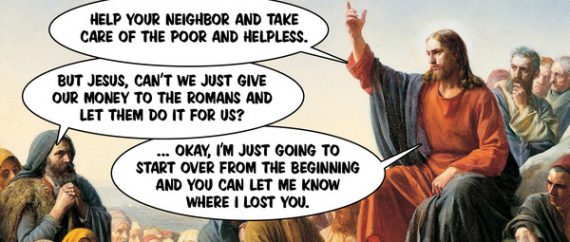
When this happens, we avoid bringing the fires of hellish war upon our country and instead invite the blessings of the kingdom of heaven upon our land and its people.
The Parable of the Sheep and the Goats is the last parable that Jesus ever told.
It is, therefore, a summary parable, or a key to understanding all the others.
In it, Jesus describes the central truth to living and experiencing the kingdom of God which He inaugurated on earth. Jesus is saying,
If you want to find the kingdom of God and live within it, then you need to follow Me and live where I live. And where is that? It is with the poor and needy. Go serve and minster to them, and you will be serving and ministering to Me, and in this way, will be living within and serving the kingdom of heaven.
Many people wonder where God has been hiding for all of history.
In this parable, Jesus tells us where. It is the great surprise at the end of the story. It is the final “Here I Am” of the great divine game of Hide and Seek that humans have been playing with God since Adam and Eve first hid from Him in the Garden.
And since that time, though we are the ones who hid ourselves from God, it is we who think that God has been hiding His face from us. We wonder why He doesn’t show up in strength and power to fix the world and right all wrong.
We think God is distant and neglectful. We think God is shirking His duties. And when bad things happen (and continue to happen) we cry out to the silent sky, “God! Where are you?”
But now Jesus tells us where God has been hiding all along. He has been living and dwelling with “the least of these, My brethren.”
The people we neglected and rejected throughout life are the very people among whom God has lived and dwelt. God has lived among the poor, the sick, the weak, and the hungry.
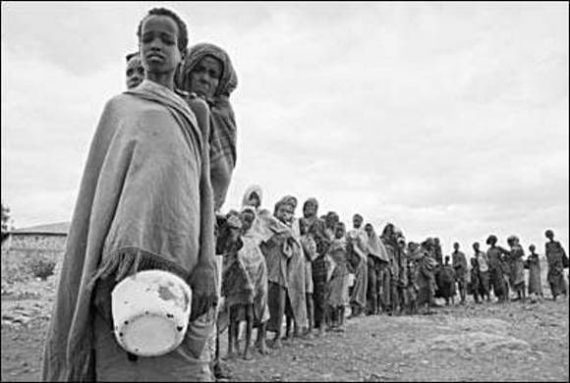
And when we love and serve them, we love and serve Him, and paradoxically, He loves and serves them through us, so that they love and serve us in return, revealing the kingdom of God, and indeed, God Himself, to us.
Throughout the ministry of Jesus, the disciples have been saying, “Show us the Father. We want to see God. We want to understand God and know what He wants of us.” And now, finally, Jesus has given the answer. “You want to see God?” He asks. “Go serve the poor, for that is where He lives.”
When we live in this way, we will experience the kingdom of God in this life, which has been prepared for us since the foundation of the world, thereby fulfilling our God-given destiny and purpose.
Those who live this way will see righteousness rise like the morning sun and blessing will come upon them like the dew.
But when we refuse to follow Jesus in this way, we will live in and experience the kingdom of hell during this life, which is guided only by selfishness, greed, hatred, rebellion, and emptiness.
Those who live this way, though they live for themselves, will only see their life burn away into nothingness, losing all purpose and significance. Such people have chosen to dwell in a hell of their own making.
 Do you have more questions about hell? Are you afraid of going to hell? Do want to know what the Bible teaches about hell? Take my course "What is Hell?" to learn the truth about hell and how to avoid hell.
This course costs $297, but when you join the Discipleship group, you can to take the entire course for free.
Do you have more questions about hell? Are you afraid of going to hell? Do want to know what the Bible teaches about hell? Take my course "What is Hell?" to learn the truth about hell and how to avoid hell.
This course costs $297, but when you join the Discipleship group, you can to take the entire course for free.



